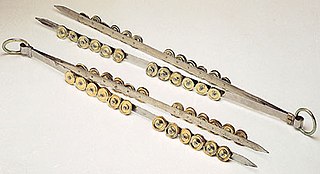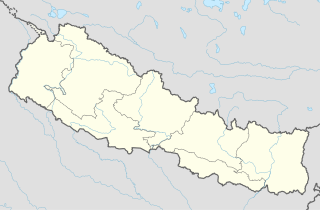
Dhol can refer to any one of a number of similar types of double-headed drum widely used, with regional variations, throughout the Indian subcontinent. Its range of distribution in India, Bangladesh and Pakistan primarily includes northern areas such as the Punjab, Haryana, Delhi, Kashmir, Sindh, Assam Valley, Gujarat, Maharashtra, Konkan, Goa, Karnataka, Rajasthan and Uttar Pradesh. The range stretches westward as far as eastern Afghanistan. A related instrument is the dholak or dholki.

Rajinder Singh Rai, better known by his stage name Panjabi MC, is a British recording artist, rapper, producer and DJ of Punjabi ethnicity. He is best known for the worldwide bhangra hit, "Mundian To Bach Ke" of 1998, which sold 10 million copies worldwide, making it one of the best-selling singles of all time. Among other songs, he gained acclaim with the 2003 release "Jogi". Allmusic has called him "one of the most prominent names in bhangra".

Chimta literally means tongs. Over time it has evolved into a traditional instrument of South Asia by the permanent addition of small brass jingles. This instrument is often used in popular Punjabi folk songs, Bhangra music and the Sikh religious music known as Gurbani Kirtan.

Music of Punjab reflects the traditions of the Punjab region of the Indian subcontinent, currently divided into two parts: East Punjab (India) and West Punjab (Pakistan). The Punjab has diverse styles of music, ranging from folk and Sufi to classical, notably the Patiala gharana.
Malkit Singh, MBE is England-based Punjabi bhangra singer. Born in Hussainpur and raised in Nakodar, he moved to Birmingham in 1984. Singh was the first Punjabi singer to be honoured with an MBE by Queen Elizabeth II at Buckingham Palace. He was most famous for the songs "Gur Nalo Ishq Mita", "Tootak Tootak Tootiyan", "Kurri Garam Jayee", "Dekh li vilyait", "Chal Hun", and "Jind Mahi", the latter two from the soundtrack to the popular film Bend It Like Beckham.
The Bollywood Brass Band is a brass band playing Bollywood and traditional Indian music, based in London, England.

Harcharanjit Singh Rupal known professionally as Channi Singh, is a British-Indian bhangra musician, known as the "godfather" of bhangra in the West. Channi is the co-founder, lead singer, producer, and director of Alaap. He came from Malerkotla, Punjab to the UK in 1975 and gradually started the popularity of Punjabi music among the Punjabi youth in the UK, forming the Alaap group in 1977 with Harjeet Gandhi, Randhir Sahota and Inder Kalsi.

"Mundian To Bach Ke", also titled "Beware of the Boys " or "Beware", is a bhangra song produced by Panjabi MC, with vocals and lyrics by Punjabi artist Labh Janjua. The song was originally released in 1997, produced by Panjabi MC in Birmingham, United Kingdom for the album Legalised. Following its re-release as a single in 2002 with Jay-Z, it achieved considerable worldwide success, topping the singles charts in Italy and Belgium (Wallonia), and charting highly in many other countries. The song sold 10 million copies worldwide, making it one of the best-selling singles of all time.
The culture of the Punjab encompasses the spoken language, written literature, cuisine, science, technology, military warfare, architecture, traditions, values and history of the Punjabi people native to the northern part of the Indian subcontinent. The term 'Punjabi' can mean both a person who lives in Punjab and also a speaker of the Punjabi language. This name originates from the Persian language 'panj', (five), and 'ab', (water). Combined together the word becomes Panjab or Punjab: land of the five rivers. Indus River, and the five other rivers to the south eventually join Indus or merge into it later in the downstream of the Punjab valley. All the rivers start and flow out of the Himalayas. These other five rivers are Jhelum River, Chenab River, Ravi River, Beas River and Sutlej River.

Punjabi dances are an array of folk and religious dances of the Punjabi people indigenous to the Punjab region, straddling the border of India and Pakistan. The style of Punjabi dances ranges from very high energy to slow and reserved, and there are specific styles for men and women. Some of the dances are secular while others are presented in religious contexts.
DJ Rekha is a London-born musician, DJ, producer, curator, and activist. She has been credited with pioneering Bhangra music in North America. Her first album, DJ Rekha Presents Basement Bhangra, released in October 2007 on Koch Records, fuses the Indian genre of bhangra music with international hip-hop and drum beats.
Parmjit Singh Sidhu, professionally known as Pammi Bai, is an Indian singer, songwriter and Bhangra dancer from Patiala.
Amandeep Singh Hayer, better known as Aman Hayer, is a UK-based Bhangra producer and singer.

Amrinder Singh Gill is an Indian Punjabi actor, singer, songwriter, film producer.
Nachhatar Gill is a Punjabi musician and singer-songwriter. He was born to a Sikh family at their village Akaalgarh near Badesron, Tehsil Garhshankar, Punjab, India. Gill was very fond of music. His father was a kirtani. He used to sing along with his father at their village's temple's annual program. Gill got popularity with his solo song "Dil Ditta Nahin Si". His two religious albums are Sahib Jinah Diyan Mane (2006), and Ardaas Karaan (2010). He appeared in his first movie, Gal Sun Ho Gaya in 2012. He has appeared in three more films since then, the latest one being Jugaadi Dot Com in 2015.
Punjabi folk music is the traditional music on the traditional musical instruments of the Punjab region of the Indian subcontinent. There is a great repertoire of music from the time of birth through the different stages of joy and sorrow till death. The folk music invokes the traditions as well as the hardworking nature, bravery and many more things that the people of Punjab get from its gateway-to-India geographical location. Due to the large area with many sub-regions, the folk music has minor lingual differences but invokes the same feelings. The sub-regions, Malwa, Doaba, Majha, Pothohar, and hills areas, have numerous folk songs.

Ashke is a 2018 Indian-Punjabi film based on popular folk dance Bhangra and is written by Dheeraj Rattan and directed by Amberdeep Singh. It stars Amrinder Gill, Sanjeeda Shaikh, Roopi Gill in lead roles and Sarbjit Cheema, Hobby Dhaliwal, Jaswinder Bhalla, Avy Randhawa and Gurshabad in supporting roles. Also, the film marks as debut for Roopi Gill and Sanjeeda Shaikh in Pollywood.

Rhythm Boyz Entertainment, or simply known as Rhythm Boyz is a Punjabi film production and distribution company founded by Karaj Gill and Amrinder Gill in 2014. Rhythm Boyz began to produce films in 2014 with Goreyan Nu Daffa Karo. Since then, Rhythm Boyz has quietly become perhaps the most innovative and most creative production house in the whole Punjabi industry.











